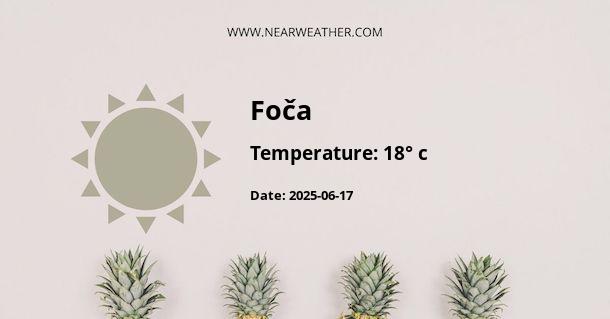The Climate and Weather Patterns in Foca, Bosnia and Herzegovina
Foca, a town situated in the eastern part of Bosnia and Herzegovina (BA), is known for its diverse climate influenced by a mix of Mediterranean, oceanic, and continental climates. This unique blend results in weather conditions that offer distinct experiences throughout the year. As we delve into the climate and weather patterns of Foca, we will explore various factors that influence its atmospheric behavior.
Geographic and Climatic Influences
The geographic positioning of Foca at the confluence of the Drina and Ćehotina rivers, surrounded by the Dinaric Alps, plays a significant role in its climate. The complex topography leads to microclimatic zones, creating a mosaic of weather conditions within a relatively small area. To comprehend Foca's weather cycle, it is essential to consider these geographical influences.
Seasonal Climate Overview
Foca's climate can be characterized by warm summers and chilly winters, with transitional spring and autumn seasons that bring a mix of both. Precipitation is relatively evenly distributed throughout the year, although certain patterns prevail.
Winter
Winter months in Foca can bring about cold temperatures, often dipping below freezing. Snowfall is common, and the town can experience significant snow accumulation due to its proximity to the mountains. Winter sports enthusiasts frequently visit nearby areas for skiing and snowboarding activities. The average low temperature in January, the coldest month, ranges around -3°C (27°F).
Spring
The onset of spring heralds a gradual increase in temperature, with late frosts occasionally occurring as late as May. The weather is generally unpredictable during this transitional season, but it provides a delightful display of blossoming flora in the region. Precipitation in the form of rain is frequent and aids the lush vegetation.
Summer
Summers are warm in Foca, with July and August being the hottest months, where temperatures can soar to an average high of around 26°C (79°F). However, the presence of nearby forests and rivers tends to moderate the heat, especially during the nights, providing a comfortable climate for both locals and visitors.
Autumn
Autumn sees a noticeable drop in temperature as the season progresses. While early autumn can still offer pleasantly warm days, the latter part introduces brisk winds and increasing precipitation, signaling the approach of winter. It is also a period of picturesque scenery, with the changing colors of leaves in the woodlands around Foca.
Monthly Climate Averages
To give a better perspective on the weather in Foca, the following table illustrates the typical temperature and precipitation patterns across the year:
| Month | Average High (°C) | Average Low (°C) | Precipitation (mm) |
|---|---|---|---|
| January | 4 | -3 | 80 |
| February | 5 | -2 | 70 |
| March | 10 | 0 | 80 |
| April | 15 | 4 | 90 |
| May | 20 | 9 | 100 |
| June | 24 | 12 | 100 |
| July | 26 | 14 | 80 |
| August | 26 | 14 | 80 |
| September | 21 | 10 | 90 |
| October | 16 | 6 | 100 |
| November | 10 | 2 | 110 |
| December | 6 | -1 | 100 |
Extreme Weather and Variability
Like many regions around the globe, Foca is not immune to extreme weather events and climate variability. With changing global weather patterns, Foca has experienced shifts that have manifested in hotter summers, colder winters, or unforeseen weather events. Expert opinions and meteorological research indicate that these variations could continue, emphasizing the need for preparedness and adaptability within the community.
- Heatwaves: Occasional spikes in temperature during the summer months are a testament to the influence of global warming, where extreme heat can lead to increased stress on the local ecosystem and demand for electricity.
- Floods: Given its riverine location, Foca is susceptible to flooding, especially during periods of heavy rain. These events have a significant impact on infrastructure and livelihoods.
- Cold Snaps: Sudden and intense drops in temperature during winter months can lead to challenges, particularly in areas of transport and energy consumption.
Conclusion
In summary, Foca's climate is marked by its continental influence with a touch of Mediterranean freshness, resulting in a rich tapestry of weather conditions that cater to various preferences and interests throughout the year. As the world's climate evolves, so too does the local weather in Foca, reflecting the broader trends of an interconnected global environment.
It is crucial for visitors and residents alike to stay informed of the latest weather forecasts and to comprehend the historical and seasonal trends when planning activities or preparing for potential extreme weather events. In doing so, Foca can continue to be enjoyed as a destination that is as climatically diverse as it is culturally rich.
A - Foča's Latitude is 43.505001 & Longitude is 18.778610.
A - Weather in Foča is 4° today.
A - Climate Conditions in Foča shows overcast clouds today.
A - Humidity in Foča is 97% today.
A - Wind speed in Foča is 2.95 km/h, flowing at 14° wind direction. today.
